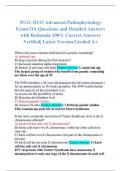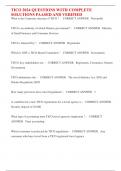WGU D115 Advanced P athophysiology Exam OA Questions and Detailed Answers with Rationale 100% Correct Answers Verified | Latest Version Graded A+ What is the most common indication for genetic counseling? A) maternal age B) drug exposure during the first trimester? C) Increased maternal alpha -fetoprotein D) history of previous still birth Correct Answer A) maternal age The largest group of women who benefit from genetic counseling are those over the age of 35 The FNP schedules a 38 -year-old primigravida (first time pregnancy) for an amniocentesis at 16 weeks gestation. The FNP would explain that the purpose of this procedure is to: A) Assess for the possibility of twins B) Deterime the biliruben level C) Perform genetic studies D) Assess L/S ratio Correct Answer C) Perform genetic studies This womans age puts her at risk for Down Syndrome In the most commonly seen form of Turner Syndrome, how is the X chromosome affected? A) Each cell has only one X chromosome? B) Some cells have two X chromsomes, while the other cells have only one. C) Each cell has two X chromsomes, but part of the chromosome is missing. D) Each cell has an extra X chromosome Corre ct Answer A) Each cell has only one X chromsome 45% of persons with Turner Syndrome have monosomy X meaning there is only one copy of the X chromosome in each cell. The FNP is assessing a newborn who is demonstrating a high -pitched cry, microcephaly, hype rtelorism, hypotonia, and a low birth weight. The FNP would suspect which of the following genetic conditions? A) Down Syndrome B) Cri du chat C) Charge syndrome D) Duncan disease Correct Answer B) Cri du chat The clinical symptoms of cri du chat syndrome usually include a high -pitched cat -like cry, mental retardation, delayed development, distinctive facial features, small head size (microcephaly), widely -spaced eyes (hypertelorism), low birth weight and weak muscle tone (hypotonia) in infancy. When expla ining the types of adaptive immunity, the FNP student is aware that: A) Adaptive immunity is a cell -mediated immune response which is B) Adaptive immunity is the level of immunity that all persons are born with. C) Adaptive immunity occurs when antibodies are passed from the mother to the fetus. D) Adaptive immunity occurs through immunization. Correct Answer A) Adaptive immunity is a cell -mediated immune response which is carried out by T cells and B cells. There are two types of adaptive immunity respons es: the cell -
mediated immune response, which is carried out by T cells, and the humoral immune response, which is controlled by activated B cells and antibodies. A woman has sustained a traumatic brain injury. She is able to follow simple commands and can manipulate objects. Which term describes this state? A) Coma B) Persistent vegetative state C) Minimally conscious D) Locked -in syndrome Correct Answer C) Minimally conscious When responses to the environment are seen, the patient is said to be in a minim ally conscious state Age and the admission of the Glasgow Coma Scale (GCS) are important diagnostic factors in TBI. Which GCS score describes a severe TBI? A) 13 -15 B) 12 -13 C) 9-12 D) 3-8 Correct Answer D) 3-8 The GCS is scored between 3 and 15, 3 being the worst and 15 the best. Which term describes recurrent, intrusive thoughts or impulses? A) Hallucinations B) Compulsions C) Obsessions Obsessions are recurrent and persistent thoughts, impulses, or images that cause distressing emotions such as anxiety or disgust. D) Delusions Correct Answer C) Obsessions Obsessions are recurrent and persistent thoughts, impulses, or images that cause distressing emotions such as anxiety or disgust. During an intake interview with a 26 -year-old man diagnosed with gener alized anxiety disorder, the FNP might observe what type of behavior? A) An inflated sense of self B) Constant relation to future events C) Inability to concentrate and irritability when questioned Impaired concentration and irritability are major characte ristics of GAD. D) Nervousness and fear of the FNP during the interview Correct Answer C) Inability to concentrate and irritability when questioned Impaired concentration and irritability are major characteristics of GAD. The FNP would expect which sympto ms in a patient with a diagnosis of schizophrenia? A) High energy with varying sleep patterns and non stop conversation. B) Extreme and frequent mood swings with hyperactivity and difficulty concentrating. C) Paranoia, delusions, hallucinations, and dimini shed self -care. D) Anti -social behavior, manipulative behavior, charisma, and ability to lie convincingly. Correct Answer C) Paranoia, delusions, hallucinations, and diminished self -care. The characteristics of schizophrenia are paranoia, delusions, tangen tial thoughts, suspiciousness, disorganized behavior, and hallucinations. The FNP is seeing a 10 year old child with complaints of otalgia and muffled hearing. The mother states the child recently recovered from an upper respiratory infection. The FNP sus pects that this child has: A) Acute otitis media B) Acute otitis externa C) Cholesteatoma D) Chronic otitis media Correct Answer A) Acute otitis media The classic presentation of otitis media is otalgia, muffled hearing, popping sensation, and a recent his tory of a cold or flare up of allergic rhinitis. The FNP understands that a potential complication of tonsillar infections, which is characterized by severe sore throat, difficulty swallowing, odynophagia, trismus, and a "hot potato" voice; accompanied by fever, chills and malaise is indicative of: A) Retropharyngeal abscess B) Epiglotitis C) Peritonsillar cellulitis D) Peritonsillar abscess Correct Answer D) Peritonsillar abscess Peritonsillar abscess is characterized by severe sore throat, pain or diffic ulty swallowing, jaw muscle spasms, and a hot potato voice.





